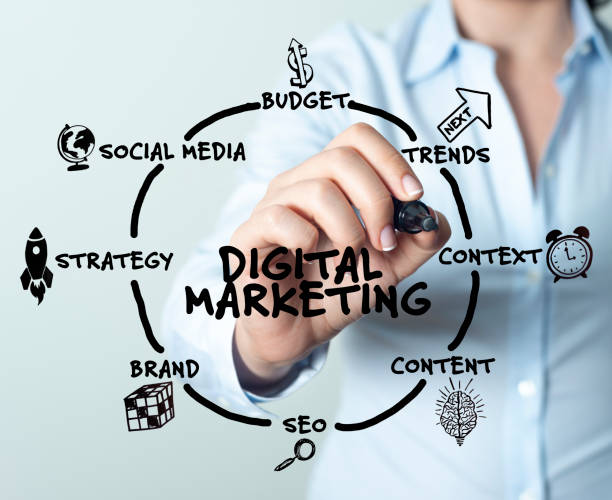Digital vs. Social: The Battle for Your Brand

Digital vs. Social: The Battle for Your Brand
by Ondray Pearson
Digital marketing encompasses all online marketing efforts, including search engine optimization (SEO), search engine marketing (SEM), email marketing, content marketing, and social media marketing. It’s a broad term that encompasses any marketing activity that utilizes digital channels to connect with customers and achieve business goals.
What is Digital Marketing?
Digital marketing encompasses a broad range of online and offline marketing tactics designed to promote products or services. It leverages digital channels to reach and engage with target audiences. Digital marketing strategies often include:
- Search Engine Optimization (SEO): Improving website visibility in search engine results.
- Pay-Per-Click (PPC) Advertising: Paying for ads to appear at the top of search engine results.
- Content Marketing: Creating valuable content to attract and retain a clearly defined audience.
- Email Marketing: Sending targeted emails to nurture leads and drive sales.
- Social Media Marketing: Utilizing social media platforms to build brand awareness and engage with customers.
What is Social Media Marketing?
Social media marketing is a subset of digital marketing that focuses on promoting products or services through social media platforms like Facebook, Instagram, Twitter, LinkedIn, and TikTok. It involves creating and sharing content, engaging with followers, and running paid advertising campaigns.
Key Differences Between Digital Marketing and Social Media Marketing
While social media marketing is a component of digital marketing, they have distinct characteristics:
- Scope: Digital marketing encompasses a wider range of channels and tactics, while social media marketing is specifically focused on social media platforms.
- Target Audience: Digital marketing can target a broader audience, while social media marketing often targets a more specific demographic.
- Goals: Digital marketing aims to achieve various goals, such as increasing brand awareness, generating leads, and driving sales. Social media marketing, on the other hand, is more focused on building relationships with customers and promoting brand loyalty.
Why Should You Care?
Understanding the difference between digital marketing and social media marketing is crucial for businesses of all sizes. By leveraging both effectively, you can:
- Increase Brand Awareness: Both digital marketing and social media marketing can help you reach a wider audience and build brand recognition.
- Generate Leads: By creating high-quality content and running targeted campaigns, you can attract potential customers and convert them into leads.
- Drive Sales: Effective digital marketing and social media marketing strategies can directly impact your bottom line by driving sales and revenue.
- Improve Customer Engagement: Social media platforms provide an opportunity to interact with customers directly, build relationships, and gather valuable feedback.
- Measure Your Results: Both digital marketing and social media marketing offer a wide range of analytics tools to track your performance and measure your ROI.
Integrating Digital and Social Media Marketing
While these two strategies are distinct, they can work synergistically to amplify your marketing efforts. Here are some tips for integrating digital and social media marketing:
- Consistent Branding: Maintain a consistent brand message across all channels, including social media.
- Cross-Promotion: Share your social media content on your website and in email newsletters.
- Leverage Social Media for Content Promotion: Use social media to share your blog posts, articles, and other content.
- Monitor Social Media Conversations: Keep track of brand mentions and respond promptly to customer inquiries and feedback.
- Use Social Media Analytics: Analyze your social media metrics to identify trends and optimize your strategy.
By combining the power of digital marketing and social media marketing, you can create a comprehensive marketing strategy that will help your business thrive in the digital age.
In Conclusion
Understanding the nuances between digital marketing and social media marketing is crucial for businesses of all sizes. While social media marketing is a powerful tool within the broader digital marketing landscape, it’s essential to recognize its limitations and leverage a comprehensive digital marketing strategy.
By effectively combining both approaches, you can:
- Maximize your reach: Tap into a wider audience across various online channels.
- Enhance brand awareness: Build a strong brand identity and increase visibility.
- Drive customer engagement: Foster meaningful connections with your target audience.
- Generate leads and sales: Convert website visitors into paying customers.
- Measure and optimize your efforts: Track key metrics to refine your strategy.
Remember, a well-rounded digital marketing strategy requires a blend of creativity, data-driven insights, and strategic planning. By staying informed about the latest trends and best practices, you can position your business for long-term success.
Are you hungry for more actionable tips? Our ODPBLOGNEWS is your one-stop shop for expert strategies, insightful articles, and powerful tools to fuel your digital success. Visit today and stay ahead of the curve! #digitaltips #ODPBLOGNEWS.
NY weekly Hi there to all, for the reason that I am genuinely keen of reading this website’s post to be updated on a regular basis. It carries pleasant stuff.
Noodlemagazine I very delighted to find this internet site on bing, just what I was searching for as well saved to fav
Noodlemagazine This is my first time pay a quick visit at here and i am really happy to read everthing at one place